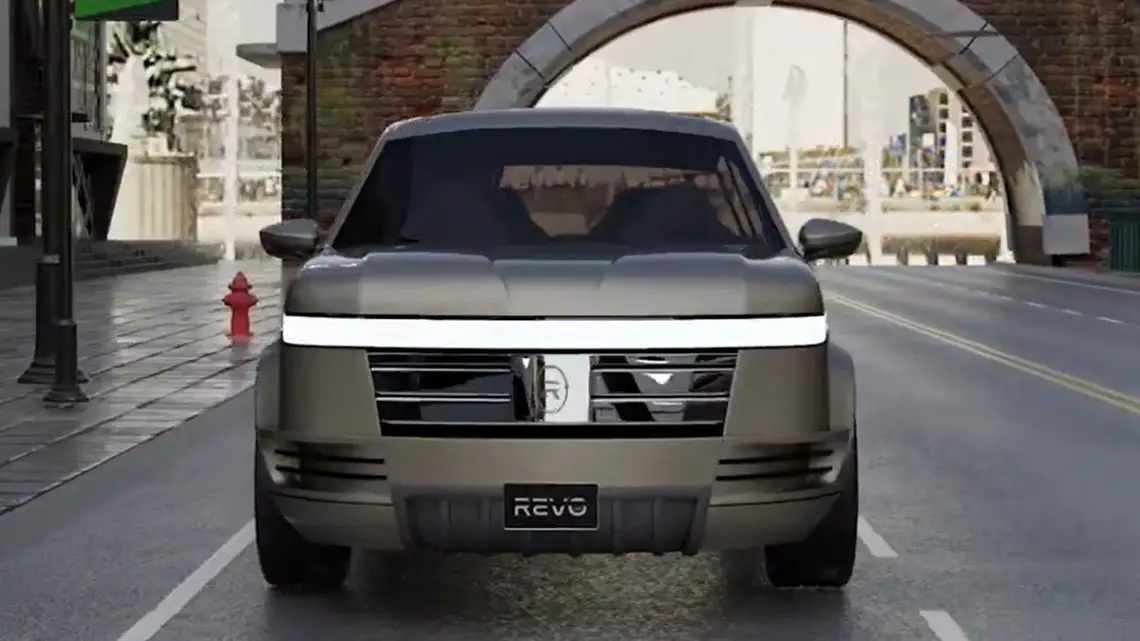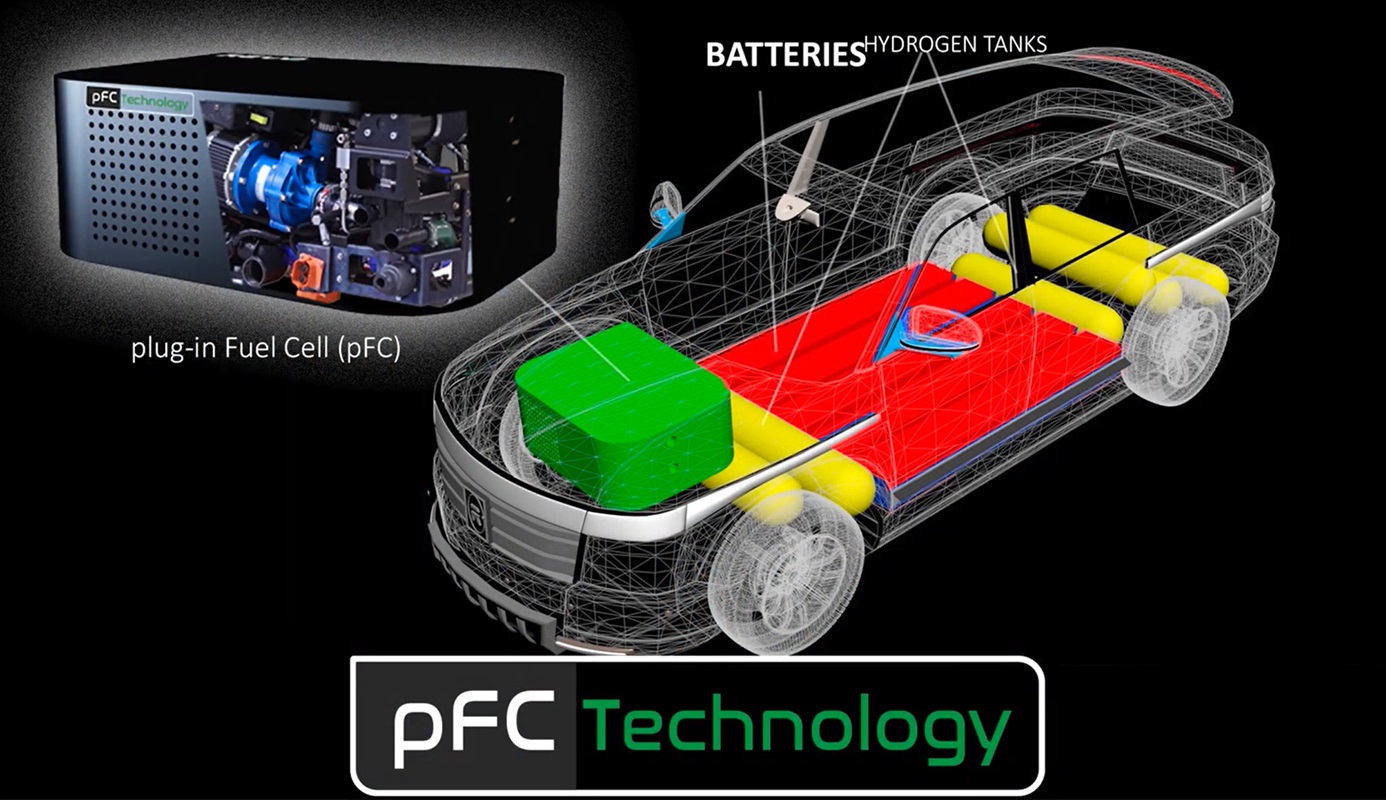
Revo Zero green lights pre-orders for its hydrogen SUV, Energy
January 9, 2024It’s a first-of-its-kind plug-in hydrogen-battery hybrid vehicle.
Revo Zero, a Virgina-based start-up, is taking pre-orders for its hydrogen SUV, Energy, which is a pFC (plug-in fuel cell) technology zero-emissions SUV vehicle.
A vehicle unlike other hybrid cars.
Unveiled in December 2023, Revo Zero’s hydrogen SUV breaks the mold of traditional electric vehicle hybrid vehicle designs. In fact, it’s a first of its kind as far as plug-in hybrid vehicles go.
More specifically, compared to other plug-in hybrids on today’s market, Energy uses hydrogen instead of a fossil fuel-powered internal combustion engine as back-up power for the on-board battery. The vehicle is able to use hydrogen through the integrated pFC unit that houses the fuel cell (provided by Nuvera) and battery.
Revo Zero’s innovative pFC Technology brings together a plug-in fuel cell with a battery and hydrogen tanks. Ultimately, the result is a plug-in fuel cell module that combines the best features of each technology.
The battery functions as the primary power source while the hydrogen fuel adds power to extend the vehicle’s range.
The zero-emission EV and hydrogen SUV hybrid boasts an up to 700-mile range.
According to the automaker, their unique technology allows for fast refueling (as little as 7 minutes on average with H70 dispenser) and extended range, up to 700+ miles (longest EV range in the market).

Hydrogen SUV – REVO ZERO pFC Technology – Image Source: Revo Zero YouTube Video
This hybrid EV hydrogen SUV (which looks something like an SUV with minivan features) is ideal for both short and long-distance trips.
A release date has not been announced.
 Although Revo Zero is presently accepting pre-orders for its limited run of model Energy vehicles, at the time this article was written, the company has not stated where the vehicle will be manufactured, when it will be ready, or what the final price tag will be.
Although Revo Zero is presently accepting pre-orders for its limited run of model Energy vehicles, at the time this article was written, the company has not stated where the vehicle will be manufactured, when it will be ready, or what the final price tag will be.
Presently, the official Revo Zero site states, “The model ENERGY is currently in development and will be launched once all safety testing is completed. We will keep you updated on the production and delivery status.”
For now, those who are interested in pre-ordering the battery and hydrogen SUV hybrid can do so via the company’s official site by making a $500 deposit (fully refundable).
Ready to test your knowledge on the most abundant element in the universe? Take our fun and engaging Hydrogen Quiz now! [forminator_quiz id=”58712″]



 With over 15 years of reporting hydrogen news, we are your premier source for the latest updates and insights in hydrogen and renewable energy.
With over 15 years of reporting hydrogen news, we are your premier source for the latest updates and insights in hydrogen and renewable energy.
So how insane am I? No delivery date. No range on the battery/plug-in. Are they going to use a couple replaceable/refillable hydrogen tanks? I’ve been driving a phev too long to throw money into something with no spec s…..
Frank is right: no details of when and where you can buy one. My understanding from the video is that the Revo Zero battery can be charged directly from a charging point (all hydrogen powered vehicles have a battery to be able to recover braking and slowing down energy). I asked Toyota many years ago to incorporate a charging socket to charge the small battery in their Mirai; the answer is a bit vague but boiled down to the fact that their battery is too small so to make it sensible to allow the battery to be charged separately, you would need a larger battery making the vehicle much heavier.
What’s the revolutionary idea here? Existing hydrogen fuel cell cars and trucks have a fuel cell to power the electric motor drivetrain, with a relatively small battery on board as a buffer and to capture regenerative braking energy. This “pFC” is just offering a plug-in connection for charging the battery directly, presumably for when hydrogen fuel is not available. But a primary advantage of an FCEV is the weight savings over a BEV. Carrying a heavy full-size battery system AND a fuel cell doesn’t make much sense. The Chevy Volt carries an internal combustion engine and gasoline fuel tank to power a generator to continuously recharge its batteries to extend its battery range. But with an adequately sized fuel cell, the vehicle should rely primarily on the FC for its propulsion power, with just a small battery needed as a storage buffer and to store energy from regenerative braking. No need to ever plug it in, just replenish the hydrogen supply.
This looks like a Toyota Mirai but with more batteries and a plug-in option.
Every plug-in hybrid should have 50-100 miles of battery to be economical to drive daily. If not we’ll still be locked in to pay whatever the hydrogen or gasoline suppliers are going to charge!